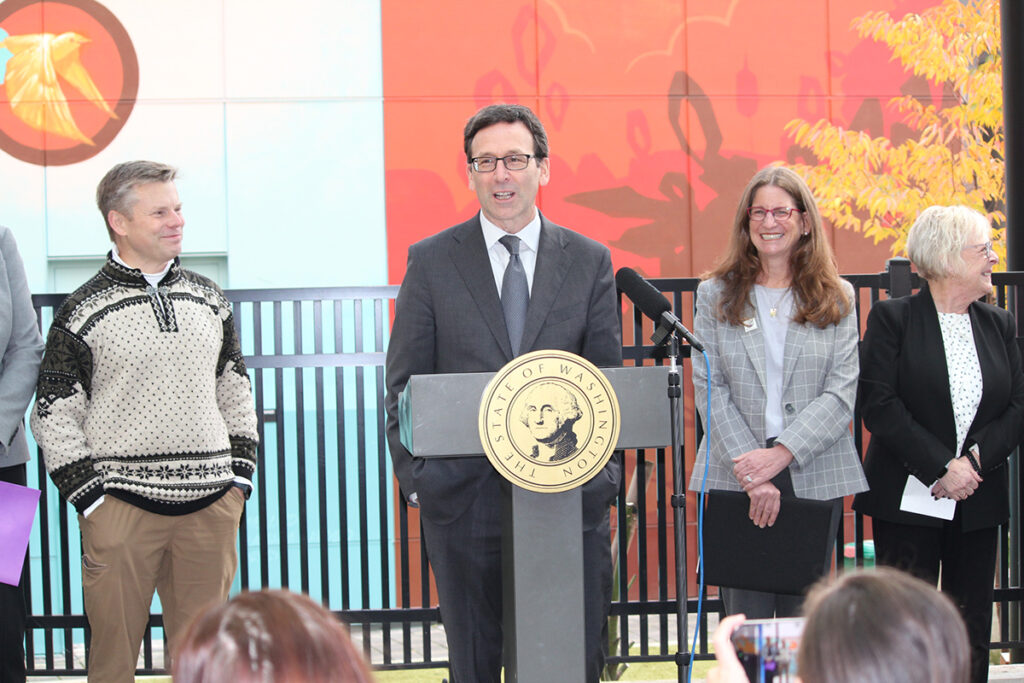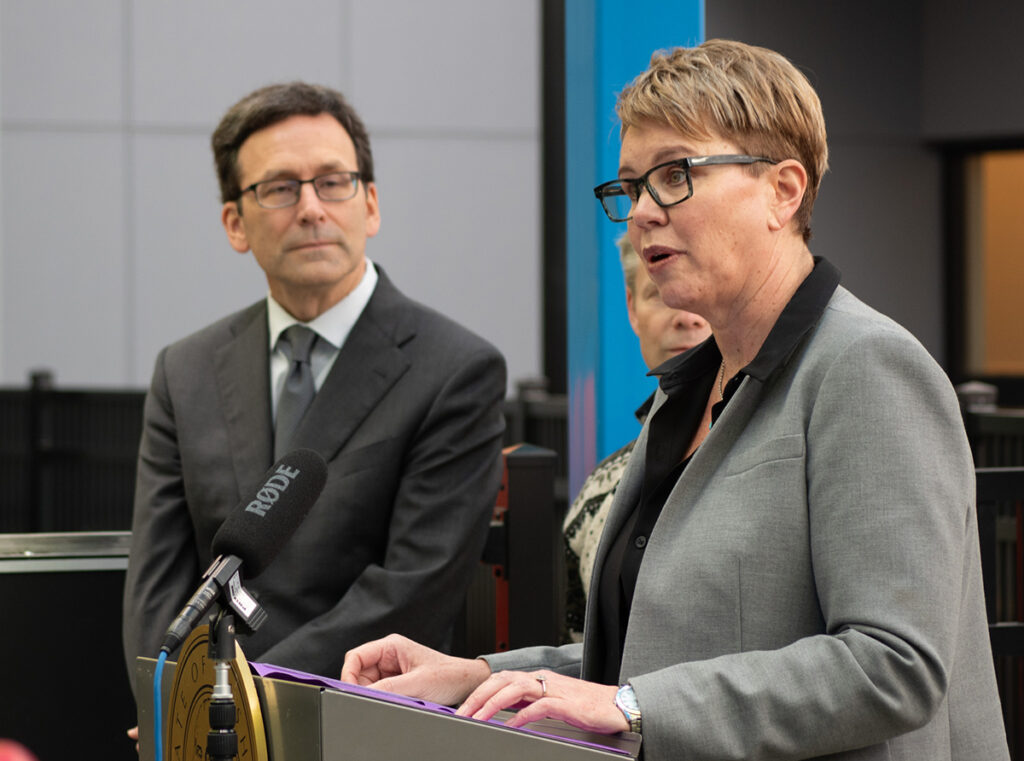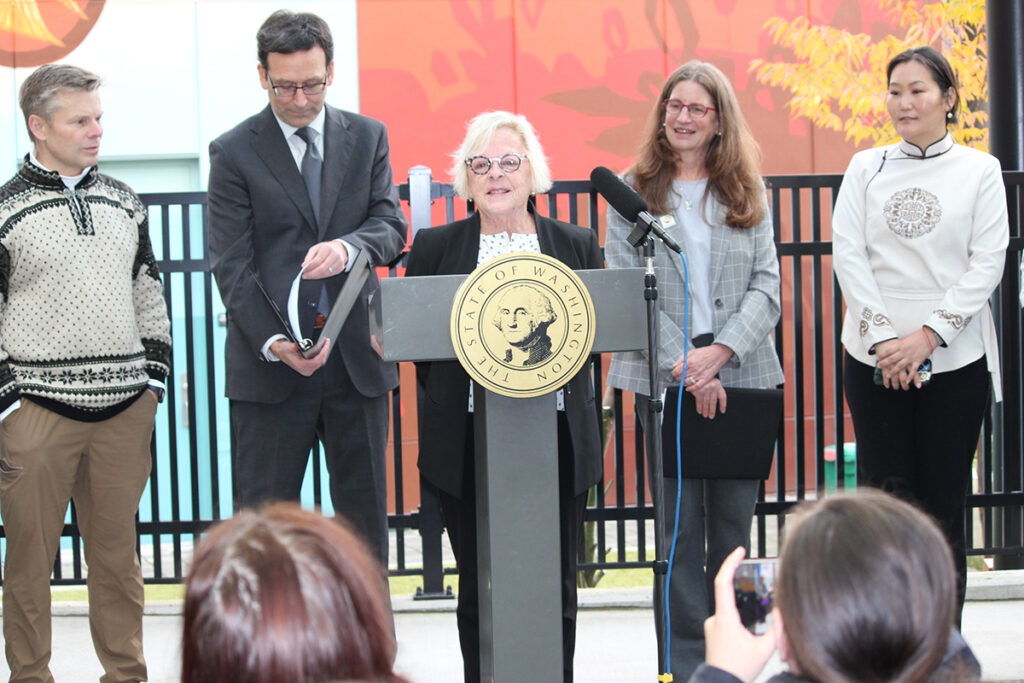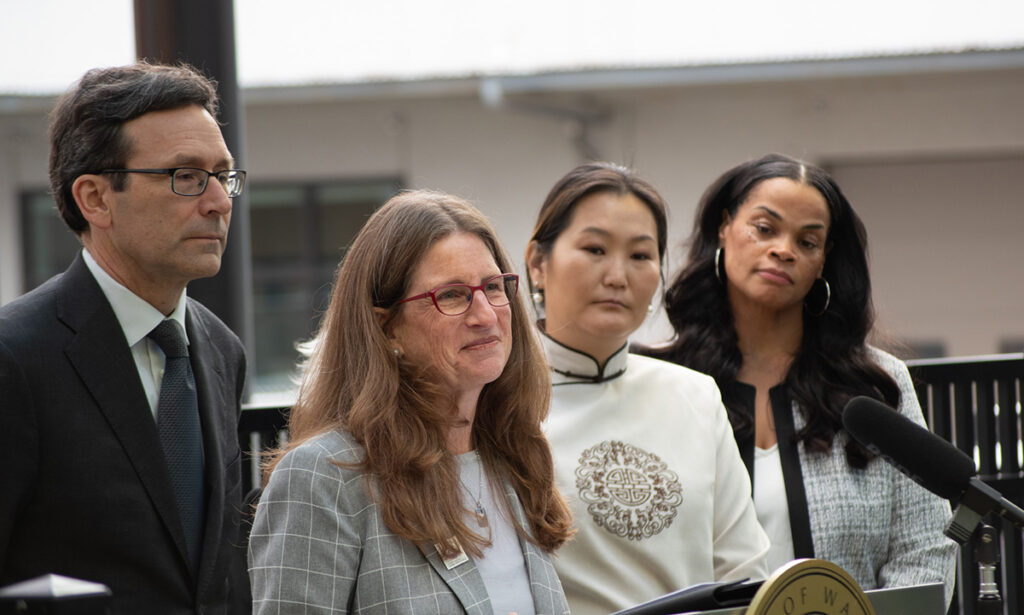By James Tabafunda
NORTHWEST ASIAN WEEKLY
Even a federal government shutdown could not stop philanthropies from supplementing major projects funded by the government. The Ballmer Group (BG) announced on Nov. 12 a decade-long grant to dramatically grow Washington’s Early Childhood Education and Assistance Program (ECEAP), funding as many as 10,000 additional preschool slots for children ages 3 and 4 from low-income families.

Gov. Bob Ferguson
Gov. Bob Ferguson supported the philanthropy’s donation at the Denise Louie Education Center (DLEC) in Seattle’s Yesler Terrace, which could total more than $1 billion over 10 years. The grant aims to increase ECEAP enrollment from approximately 14,500 children in the 2026-27 school year to nearly 25,000 when the program takes full effect.
ECEAP, established in 1985, offers free preschool, family support, nutrition programs, and preventive health screenings. During the 2023-2024 school year, ECEAP served more than 16,000 children at more than 480 locations across Washington state.
“This is one of those investments—I think it was referred to as a grant for the investment they’re making,” Ferguson said during the news conference at the center named for Denise Louie, the late Chinese American urban planning student at the University of Washington and community volunteer. The choice of venue signals the importance of community-based programs serving vulnerable, multicultural families.
“It’d be hard to quantify how significant that investment will be for our state,” the governor said.
Current challenges
The grant comes at a time of critical need: Washington faces a projected $12 billion to $16 billion budget shortfall over the next four years, forcing delays to early learning developments even as federal Head Start funding faced threats during the recent government shutdown. For immigrant families having to deal with early childhood education in a new country, the expansion promises to lower barriers that have historically limited access to quality preschool.
It addresses urgent needs created by Washington’s budget crisis. The state’s 2025-2027 operating budget, signed into law in May, delayed full ECEAP implementation from the 2026-27 school year to 2030-31 and eliminated approximately 3,000 part-day slots. Those cuts postponed eligibility expansions promised under the Fair Start for Kids Act, a landmark 2021 legislation that invested $1.1 billion to make childcare and early learning more affordable for Washington families.

(From left to right): Gov. Bob Ferguson; Andi Smith, executive director for Washington State and National Behavioral Health at Ballmer Group
Andi Smith, executive director for Washington State and National Behavioral Health at BG, said, “Today, I’m proud to announce that Ballmer Group is committing to fund up to 10,000 new school-day ECEAP seats per year for the next 10 years. This grant is structured as a resource to the state to grow access for families and fully realized, will amount to a commitment of about $170 million a year in new ECEAP funding for the next decade.”
“At Ballmer Group, we focus on helping kids move up the economic ladder,” she said. “A significant area of focus for us in Washington is actually in the earliest years we know, and data has proven that high quality early childhood education is one of the most powerful tools we have to expand opportunity and promote economic mobility.”
The grant will cover school-day ECEAP slots running 5.5 to 6.5 hours daily, four or five days weekly during the school year. Smith emphasized that the funding structure requires the state to maintain current public funding levels, ensuring philanthropic dollars supplement rather than replace state funding.
An Asian American mom in ECEAP
Buted Dashdemberel, a Seattle mother who emigrated from Ulaanbaatar, the capital city of Mongolia, delivered an emotional message about how ECEAP transformed her family’s experience navigating early childhood education in America. Her story reflects the program’s critical role for immigrant families unfamiliar with U.S. educational resources and facing language barriers.
“ECEAP has given me so much support, not just for my child, but for me as a parent, too,” she said.
“I’ve learned new ways to help my children learn and grow, and I’ve met amazing teachers and staff who truly care about our families. They’ve connected me with helpful resources, supported us during difficult times, and always made me feel that I’m not alone.”
Dashdemberel spoke about how family coordinators regularly informed her about different events and activities, providing guidance she said proved essential for immigrant families with limited knowledge of such information.
Her son’s ECEAP classroom offers Chinese language instruction alongside English, creating what she called a “classroom full of diversity, where children learn from each other and learn to respect different languages and cultures.” She noted that teachers demonstrate patience with children from multiple countries who arrive speaking little or no English, including her son.
She credited the program with helping both of her children—her son and her 9-year-old daughter, now a fourth-grader, who attended the same program years earlier—successfully thrive in American schools.
“Many of us face language barriers and challenges as we start new lives here. ECEAP gives our children a strong start and gives parents hope and confidence, a sense of community,” Dashdemberel said.
Community leader reactions
Angel Lewis, education director at DLEC, said the BG announcement brings “fresh, vibrant news for our families, and we truly celebrate this news that is coming” after challenging headlines about federal shutdowns and funding cuts threatening early childhood education programs nationwide.
“Denise Louie is committed to fostering innovative, high-quality educational experiences that inspire, grow curiosity and the love of learning for all children in our communities,” she said.

State Sen. Claire Wilson, D-Federal Way
State Sen. Claire Wilson, vice chair for early learning on the Senate Early Learning & K-12 Education Committee, co-sponsored the Fair Start for Kids Act and previously spent 25 years administering Washington’s largest ECEAP.
“During these challenging budget times, I am just incredibly, incredibly honored to stand here and to say that philanthropy has stepped in to help us meet the needs of families across our state, and I am beyond thankful to Ballmer Group for their support,” Wilson said.

(From left to right): Gov. Bob Ferguson; Tara Senn, secretary of the Department of Children, Youth, and Families; Buted Dashdemberel, a Mongolian American mother in the ECEAP; Angel Lewis, education director at Denise Louie Education Center
Tara Senn, secretary of the Department of Children, Youth, and Families, pointed out that ECEAP serves families “furthest from opportunity” who would be unlikely to access early childhood education without state support.
“Knowing this, ECEAP connects with these families and helps them, stands alongside them, works with them all along the way to make sure they get through the application process, the enrollment process, and beyond,” she said.
ECEAP’s short-term future
Ferguson said passing enabling legislation—creating an account to accept the grant—will be a top priority and getting the state to begin enrolling children in newly funded slots this fall, though full implementation will require time to hire staff, expand facilities, and recruit providers. “It’s going to take us time to ramp up, to realize the full magnitude of the gift and the partnership. But we are going to be moving heaven and earth to make that happen,” he said.
“Sen. Wilson (D-Federal Way) is going to be the sponsor on the Senate side, and Rep. Steve Bergquist (D-Renton), who unfortunately could not make it today, he’ll be the sponsor on the House side.”
“We understand that when you’re finding a new workforce, when you’re finding new facilities, when you’re finding new providers, it’s just going to take time,” Smith said.
“I think that we need to get in for five years and say, how is this going? How is expansion going and is this something that we should renew?” she said about the grant’s long-term future. “TBD, I guess, is the best way to answer that question, but certainly open to the conversation after we get some road behind us.”
In 2023, the BG invested more than $43 million in Washington early childhood education, including a $38 million gift to the University of Washington College of Education for scholarships and programs. The foundation was created in 2015 after Steve Ballmer retired as Microsoft CEO.
For Dashdemberel and families like hers learning about early childhood education in a new country, the grant promises more access to opportunities that have proven valuable.
“Programs like this are so needed. They truly change lives and help families build a better future,” she said. “Being part of ECEAP has been such a big blessing for me. I’m so proud of being an ECEAP parent.”
For more information on the Early Childhood Education and Assistance Program, go to www.dcyf.wa.gov/services/early-learning-providers/eceap.
